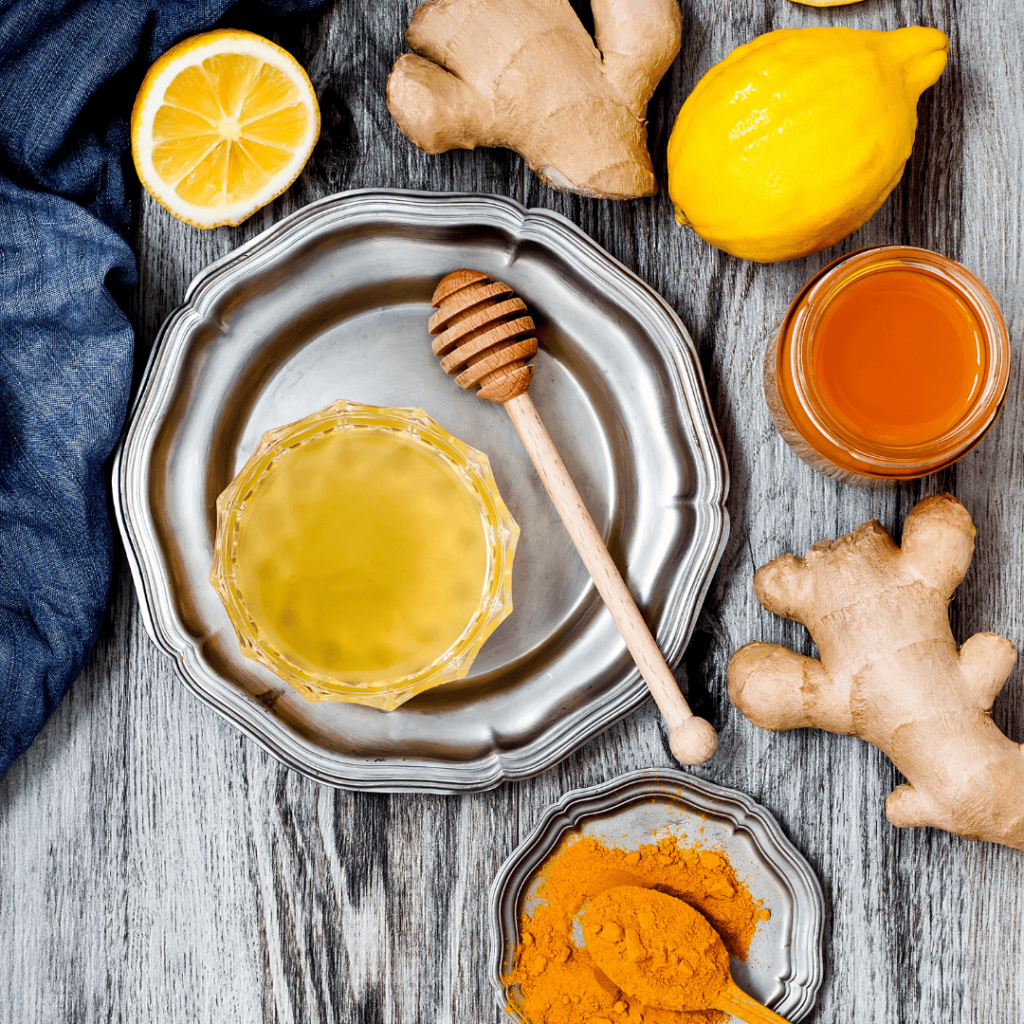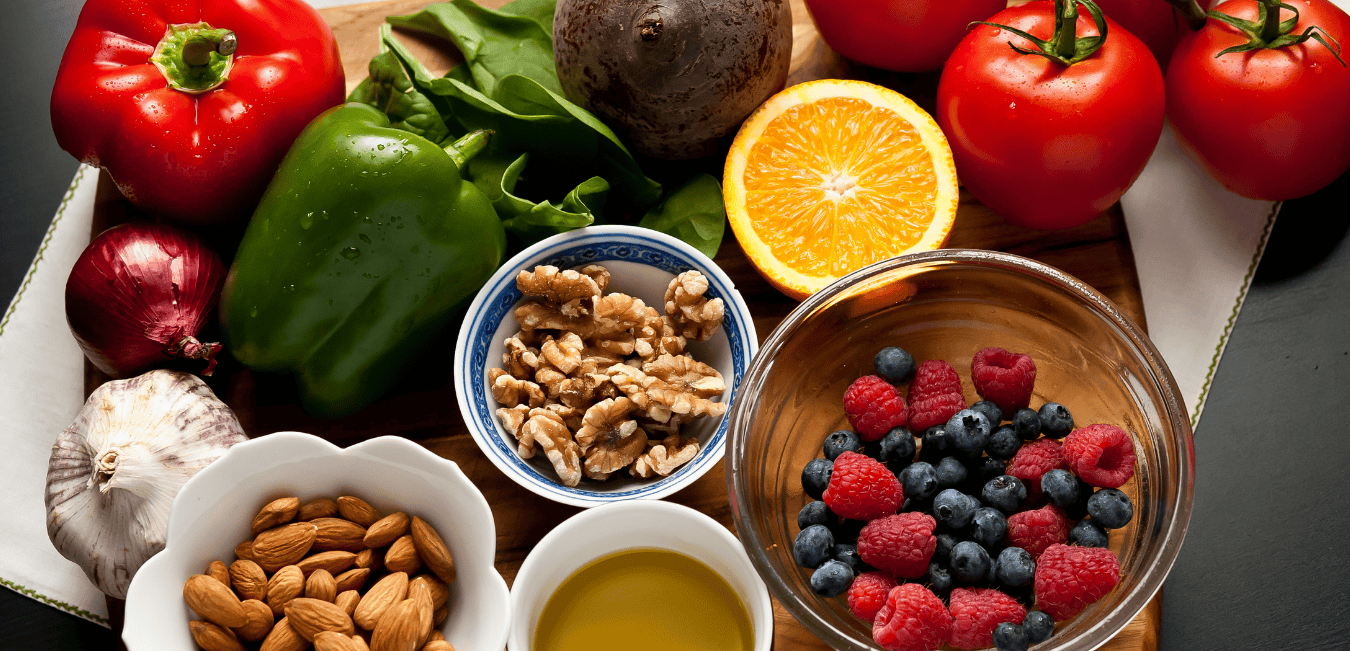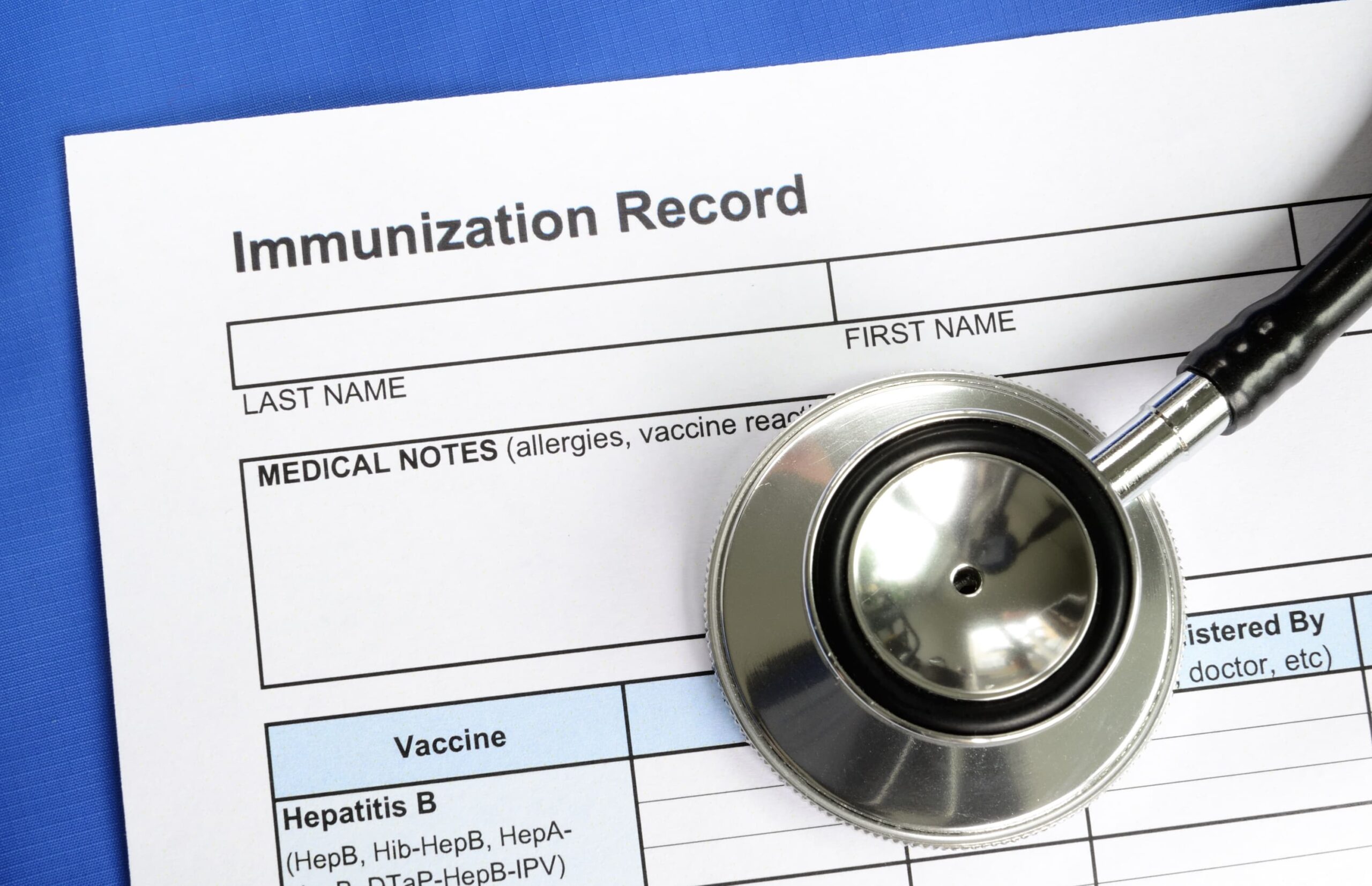Inflammation is the root cause of so many conditions in our modern era. Anti-inflammatory eating is a foundational part of treatment plans for everything from allergies to acne, heart disease, and depression. This article covers everything you need to know to get your family started on an anti-inflammatory diet, including guidelines around which foods to eat and avoid, reasonable expectations for picky eaters, and the number one mistake that I see parents make when changing their family’s diet.
Anti-Inflammatory Foods To Emphasize
Polyphenol rich foods including fruits, vegetables, cocoa, herbs, and spices are the most anti-inflammatory foods that we know of. You can look up the polyphenol content of various foods online, but it is much easier to just choose the brightest and most colorful foods. Bright yellow turmeric is one of the most anti-inflammatory foods that we know of.
Honey, molasses, maple syrup, and other unrefined sweeteners seem to have anti-inflammatory effects. This is probably due to their polyphenol content.
One of the ways that some foods may exert an anti-inflammatory effect is through their interaction with the microbiome. Unrefined beans, grains, fruits, and vegetables contain plenty of healthy fiber and promote an anti-inflammatory state in the body. Probiotics and prebiotics can also help promote an anti-inflammatory state.
Omega 3 fatty acids promote an anti-inflammatory state while omega 6 fatty acids promote a pro-inflammatory state. Choose ocean-wise, low-mercury, fatty fish like salmon, tuna, and sardines twice or more per week for their great omega 3 content. Fish oil can be taken as a supplement if regular consumption of fish isn’t possible. The best choices for cooking oils are olive oil and avocado oil.
Inflammatory Foods To Limit
Some foods are known to cause inflammation. In my opinion the worst offenders are processed foods, especially if they have added sugar, salt, additives, preservatives, or refined flour. Processed meats are especially inflammatory. Another important category of inflammatory foods to limit are fried foods and unhealthy fats and oils. Corn oil and soybean oil are two inflammatory oils which are often found in processed foods including pastries and sweets.
Foods that cause an allergic reaction are also pro-inflammatory. For example, a review of 52 studies found that dairy is pro-inflammatory in people with dairy allergies, but anti-inflammatory or neutral in people without dairy allergies. Look for raw, unpasteurized sources of dairy from reputable producers.
To learn more about food sensitivities, see 21 Different Types of Food Sensitivities – Dr. Green Mom.
Inflammation-Neutral Foods
Some foods don’t have a measurable effect on inflammation but can be part of a healthy diet anyway. High quality, unprocessed meat, coconut oil, and unprocessed or fermented dairy appear to be inflammation-neutral.
How To Get Started With Anti-Inflammatory Eating
There are two choices for making a big diet change. The first is to do a diet makeover and change everything overnight. The second is to make gradual changes. One isn’t better than the other and it mostly boils down to what is feasible for you and your family.
One strategy that many of my patients have had success with is to keep a diet diary for a week. Then to take a look at their meals and see which inflammatory foods they could easily swap out for anti-inflammatory foods.
It is important to have a go-to EASY meal for those days when chaos reigns and cooking something healthy feels out of reach. Some people prefer these easy meals to be frozen options that can easily be reheated, others have healthy restaurants bookmarked in their food delivery apps. The key here is planning ahead so that when you’re too tired or overwhelmed to make good food choices, you already know what to do.
The 70-30 Rule For Healthy Eating
The biggest mistake that I see parents making when it comes to healthy eating is having an all-or-nothing attitude about healthy and unhealthy foods. Avoiding entire food groups like sugar, dairy, or even processed food can create unhealthy attitudes and behaviors in kids and set the stage for disordered eating patterns later in life. *
However, parents also have the opportunity to model both healthy choices and a healthy relationship towards food by making the foundation of the diet at home healthful, while also having flexibility towards food. This flexibility also gives parents the opportunity to foster body awareness in their families by paying attention to how great and energetic they feel after a good meal and how that compares to how they feel after eating sugar or other processed meals.
The 70-30 rule is my favorite way of overcoming rigid attitudes about eating. Basically, this rule asks you to aim for at least 70% healthy food rather than 100%. This rule is flexible too. If you’re dealing with a flare up of an inflammatory condition, then maybe it needs to be a minimum of 80 or 90% healthy food. If you’re just getting started or dealing with picky kids or children with sensory issues, then perhaps 50% or 60% might be a more reasonable goal.
*When you’re dealing with food allergies, unfortunately, avoiding reactive foods is 100% is necessary.
Anti-Inflammatory Diets
Anti-inflammatory is a style of eating rather than a diet to follow. The most important principle for anti-inflammatory eating is to aim for a healthy balance. Most traditional ways of eating are anti-inflammatory. Diets and recipes to explore could include the Mediterranean diet, Ayurvedic diets, and/or diets related to your personal culture or heritage.
Vegetarian and vegan diets are often thought of as less inflammatory. This is partially true. Plants in general have anti-inflammatory properties and fiber-rich unprocessed beans and grains contribute to a healthy microbiome which reduces inflammation. However, simply trading out meat and replacing it with a vegetarian alternative within a diet that is still highly processed and inflammatory won’t have much beneficial effect.
I don’t recommend vegetarian or vegan diets for children because of the high risk of nutritional deficiencies and the lifelong health and developmental impacts that these can have.
Anti-Inflammatory Lifestyle
What we eat plays an important role in the inflammatory balance of our bodies, but it isn’t the only factor. Sleep, gut health, light exposure, stress, hormone and liver health, exercise, time outside, social interactions, and mood all impact the inflammatory state of our bodies. However, choosing healthier, less inflammatory foods is a powerful first step towards better health.
To learn more, see Basics Of An Anti-Inflammatory Lifestyle – Dr. Green Mom.
Summary
Anti-inflammatory eating can help manage many conditions. It is wise to aim for a flexible balance of inflammatory and anti-inflammatory foods rather than rigidly excluding foods from a diet.
Anti-inflammatory foods include most fruits, vegetables, nuts, seeds, herbs, spices, cocoa, unrefined grains, beans, and unrefined sweeteners like honey. Inflammatory foods to limit include processed food, refined food, and fried foods.
Managing inflammation requires a healthy lifestyle that extends beyond what we eat, but diet plays an essential role in maintaining a good inflammatory balance.
References:
Bordoni, A., Danesi, F., Dardevet, D., Dupont, D., Fernandez, A. S., Gille, D., Nunes Dos Santos, C., Pinto, P., Re, R., Rémond, D., Shahar, D. R., & Vergères, G. (2017). Dairy products and inflammation: A review of the clinical evidence. Critical reviews in food science and nutrition, 57(12), 2497–2525. https://doi.org/10.1080/10408398.2014.967385
Minihane, A. M., Vinoy, S., Russell, W. R., Baka, A., Roche, H. M., Tuohy, K. M., Teeling, J. L., Blaak, E. E., Fenech, M., Vauzour, D., McArdle, H. J., Kremer, B. H., Sterkman, L., Vafeiadou, K., Benedetti, M. M., Williams, C. M., & Calder, P. C. (2015). Low-grade inflammation, diet composition and health: current research evidence and its translation. The British journal of nutrition, 114(7), 999–1012. https://doi.org/10.1017/S0007114515002093
Kunnumakkara, A. B., Sailo, B. L., Banik, K., Harsha, C., Prasad, S., Gupta, S. C., Bharti, A. C., & Aggarwal, B. B. (2018). Chronic diseases, inflammation, and spices: how are they linked?. Journal of translational medicine, 16(1), 14. https://doi.org/10.1186/s12967-018-1381-2
Gammoh, N. Z., & Rink, L. (2017). Zinc in Infection and Inflammation. Nutrients, 9(6), 624. https://doi.org/10.3390/nu9060624
Bailey, M. A., & Holscher, H. D. (2018). Microbiome-Mediated Effects of the Mediterranean Diet on Inflammation. Advances in nutrition (Bethesda, Md.), 9(3), 193–206. https://doi.org/10.1093/advances/nmy013
Zinöcker, M. K., & Lindseth, I. A. (2018). The Western Diet-Microbiome-Host Interaction and Its Role in Metabolic Disease. Nutrients, 10(3), 365. https://doi.org/10.3390/nu10030365
Ranneh, Y., Akim, A. M., Hamid, H. A., Khazaai, H., Fadel, A., Zakaria, Z. A., Albujja, M., & Bakar, M. (2021). Honey and its nutritional and anti-inflammatory value. BMC complementary medicine and therapies, 21(1), 30. https://doi.org/10.1186/s12906-020-03170-5
Serafini, M., & Peluso, I. (2016). Functional Foods for Health: The Interrelated Antioxidant and Anti-Inflammatory Role of Fruits, Vegetables, Herbs, Spices and Cocoa in Humans. Current pharmaceutical design, 22(44), 6701–6715. https://doi.org/10.2174/1381612823666161123094235
Hajifaraji, M., Jahanjou, F., Abbasalizadeh, F., Aghamohammadzadeh, N., Abbasi, M. M., & Dolatkhah, N. (2018). Effect of probiotic supplements in women with gestational diabetes mellitus on inflammation and oxidative stress biomarkers: a randomized clinical trial. Asia Pacific journal of clinical nutrition, 27(3), 581–591. https://doi.org/10.6133/apjcn.082017.03
Chudzik, A., Orzyłowska, A., Rola, R., & Stanisz, G. J. (2021). Probiotics, Prebiotics and Postbiotics on Mitigation of Depression Symptoms: Modulation of the Brain-Gut-Microbiome Axis. Biomolecules, 11(7), 1000. https://doi.org/10.3390/biom11071000
Hoffman, R., & Gerber, M. (2015). Food Processing and the Mediterranean Diet. Nutrients, 7(9), 7925–7964. https://doi.org/10.3390/nu7095371
Best and Worst Oils for an Anti-Inflammatory Diet | Allrecipes
O’Connor, L. E., Kim, J. E., Clark, C. M., Zhu, W., & Campbell, W. W. (2021). Effects of Total Red Meat Intake on Glycemic Control and Inflammatory Biomarkers: A Meta-Analysis of Randomized Controlled Trials. Advances in nutrition (Bethesda, Md.), 12(1), 115–127. https://doi.org/10.1093/advances/nmaa096
Tanja K Rudolph, Kaike Ruempler, Edzard Schwedhelm, Jing Tan-Andresen, Ulrich Riederer, Rainer H Böger, Renke Maas, Acute effects of various fast-food meals on vascular function and cardiovascular disease risk markers: the Hamburg Burger Trial, The American Journal of Clinical Nutrition, Volume 86, Issue 2, August 2007, Pages 334–340, https://doi.org/10.1093/ajcn/86.2.334
Hess, J. M., Stephensen, C. B., Kratz, M., & Bolling, B. W. (2021). Exploring the Links between Diet and Inflammation: Dairy Foods as Case Studies. Advances in nutrition (Bethesda, Md.), 12(Suppl 1), 1S–13S. https://doi.org/10.1093/advances/nmab108
Valle, M., St-Pierre, P., Pilon, G., & Marette, A. (2020). Differential Effects of Chronic Ingestion of Refined Sugars versus Natural Sweeteners on Insulin Resistance and Hepatic Steatosis in a Rat Model of Diet-Induced Obesity. Nutrients, 12(8), 2292. https://doi.org/10.3390/nu12082292
DiNicolantonio, J. J., & O’Keefe, J. H. (2017). Good Fats versus Bad Fats: A Comparison of Fatty Acids in the Promotion of Insulin Resistance, Inflammation, and Obesity. Missouri medicine, 114(4), 303–307.
Parolini C. (2019). Effects of Fish n-3 PUFAs on Intestinal Microbiota and Immune System. Marine drugs, 17(6), 374. https://doi.org/10.3390/md17060374
Stratakis, N., Conti, D. V., Borras, E., Sabido, E., Roumeliotaki, T., Papadopoulou, E., Agier, L., Basagana, X., Bustamante, M., Casas, M., Farzan, S. F., Fossati, S., Gonzalez, J. R., Grazuleviciene, R., Heude, B., Maitre, L., McEachan, R., Theologidis, I., Urquiza, J., Vafeiadi, M., … Chatzi, L. (2020). Association of Fish Consumption and Mercury Exposure During Pregnancy With Metabolic Health and Inflammatory Biomarkers in Children. JAMA network open, 3(3), e201007. https://doi.org/10.1001/jamanetworkopen.2020.1007







